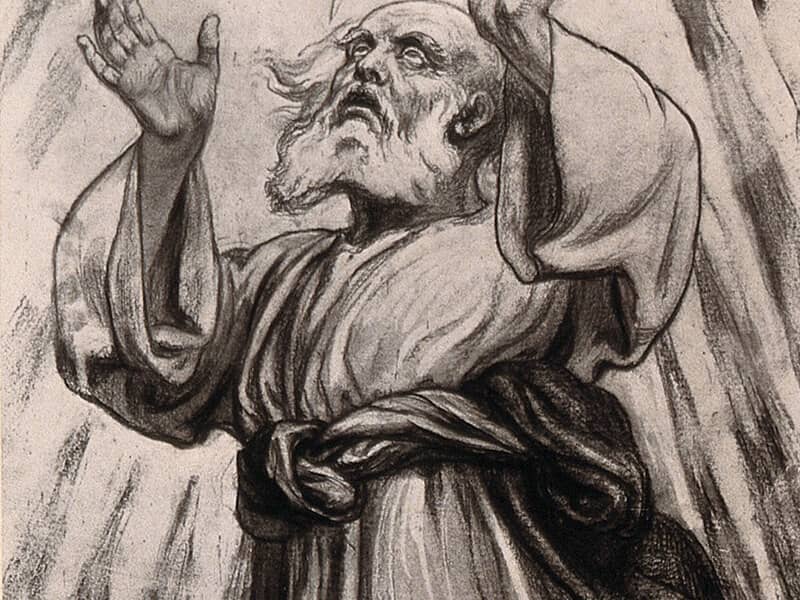His real name was Rabbi Yisroel Meir Kagan, but the sainted Jewish scholar came to be known by that snippet of a Hebrew verse - it means "one who wants life" - after the name of one of the 21 works he authored on Jewish law, this one on the prohibition of improper speech like gossip and tale-bearing. He was one of the (if not the) most important decisors of Jewish law of the 20th century (he died in 1933 at the age of 95), renowned world-wide not only for his scholarship but for his kindness, righteousness and modesty. He and his wife subsisted as the proprietors of a small grocery store, whose finances he carefully scrutinized, on alert always for any possible overcharging of a customer.
When a student informed the elderly sage of the mass deaths in Japan, he was visibly shaken, immediately undertook a partial fast and insisted that the news should spur all Jews to repentance.
Japan could as well have been Neptune to any early 20th century Polish Jew. It was a place that existed only on newspapers' pages and in stories. And the inverse relationship between distance (cultural and religious, as well as geographic) and empathy is a well- recognized part of human nature.

|
| Mass destruction has visited the world, and that cannot be something a Jew simply takes note of before moving on. |

|
Yet the Chofetz Chaim's dismay and resolve were genuine. Although there were not likely any Jews directly affected by the tragedy in Japan, the 13th century Spanish Jewish luminary Rabbeinu Yonah of Gerundi, in his commentary to Avot (3:2) describes how "the way of the righteous" is to "... pray for the peace of the entire world and feel the suffering of others."
But there is something more in the Jewish sources, something that might surprise many contemporary Jews: the idea that catastrophes, even when they do not affect Jews, are nevertheless messages for them, wake-up calls to repentance. Insurers call such occurrences "Act of G-d"; for Jews, that description is precise indeed, and demands a response.
It is, to be sure, a very particularist idea, placing Jews in a central place within humankind. But, while Judaism considers all of humanity to possess potential holiness and while its prophetic tradition foretells the eventual movement of all of humanity to service of G-d, Judaism does in fact cast the Jews as a chosen people. That election includes the responsibility to perceive Divine messages in the trials of humankind.
And so that is an additional layer to the Chofetz Chaim's reaction, the conviction that the distinctive nature of the Jew demanded a meaningful Jewish response to the catastrophe that had occurred.
Nations have responded with aid, and countless hearts, including Jewish ones, have ached at the images and reports of parents seeking, or mourning, children; of children seeking, or mourning, parents; of lives altered radically and terribly; of others snuffed out in seconds.
But, at least from a truly Jewish perspective, there is a special reaction to those events that Jews must feel and act upon. Mass destruction has visited the world, and that cannot be something a Jew simply takes note of before moving on.
A revered contemporary Jewish sage in Israel, Rabbi Aharon Leib Steinman, was reported to have remarked shortly after the recent devastation in Asia: "Everyone sits in his own home and feels good - 'Where I am everything is fine, it's over there that people are dying' - ... we have to learn [from such tragedies] the extent of what sin causes, and it is up to us to analyze and learn... [so that we will] repent."
That repentance goes far beyond donations to relief agencies. What the Jewish sources teach is that tragic events like the one we have just witnessed must spur us to not only address global events but to focus on the microcosm that is the self. To work, in other words, on our interactions with those around us; on--as the Chofetz Chaim taught--our responsibility to use the power of speech carefully and properly; on being more observant of the Sabbath and holidays, of kashrut and all the laws of the Torah; on dedicating more time to its study.
That is the secret of how we can create a better world and vanquish evil--the source of all tragedy--at its very roots.
For when we do such things, the seeming tiny quanta of our collective merits can combine and swell, no less than drops of water that make up an ocean, into a tidal wave of goodness, ushering in the day when, as the prophet Isaiah (11:9) foretold, "the earth will be filled with knowledge of G-d, like the water that covers the oceans."

